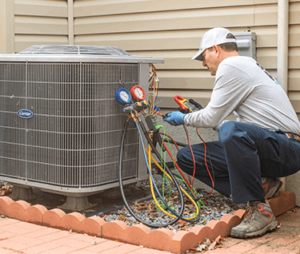Home » Posts tagged 'furnace repair'
Tag Archives: furnace repair
HVAC Installation
An HVAC Installation contractor is a professional who installs heating, ventilation, and air conditioning systems in your home. They also repair and replace existing ductwork. Depending on the type of installation, they may install new equipment inside or outside your home. The components of a new system may include an inside air handler and an outside compressor, as well as thermostats and condensate drain lines. A good HVAC contractor can also upgrade your electrical wiring, though you may need the services of a licensed electrical contractor for some major changes. For more details, contact HVAC Company.

Before hiring an HVAC contractor, make sure you have your house inspected by a professional. The contractor should be licensed, bonded, and insured. They should have been in business for at least five years. Make sure they have the same quality and size equipment as your current HVAC system. Ask for a detailed estimate and a written contract from the contractor. Make sure to pay only after the job is completed and receive a written warranty for the work performed.
The HVAC installation team will notify you of their arrival and should send you pictures and bios of the people who will be working on your new system. After the team has arrived, the lead installer will review the details of your job with you. He or she will also go over the equipment and accessories that need to be installed. A good HVAC installation contractor will also give you a detailed estimate of the entire job, including how much equipment will cost and what the final cost will be.
Proper airflow is necessary for an HVAC system to function properly. Proper airflow allows the system to deliver the proper amount of heating volume inside the home and keeps the system operating at its peak efficiency. Poor airflow may also affect the energy efficiency of your new HVAC system, forcing it to work harder to move air through the home, straining the components. An airflow issue can also lead to an overheating problem. For these reasons, it is imperative to get professional help with HVAC Installation.
An HVAC Installation technician also oversees the installation of ductwork. Since not every house is built with built-in ductwork, a trained technician can install new ductwork in your home. The technician will use a floor plan to determine where the ducts should go. In the case of a household HVAC installation, the control circuit board is located in the upper right. The fan enclosure is directly behind the control circuit board, and the capacitor is in the lower middle.
Before hiring an HVAC installer, you should compare multiple estimates. Getting a few estimates helps you to determine which company is the most affordable. Do not settle for the first one you get because the price is too low. Instead, go for a highly rated HVAC contractor. Don’t be afraid to ask questions about the process. Remember that your home’s HVAC system is your respiratory system, so regular maintenance is important for its health. Take the time to compare HVAC installation costs with other professionals and choose the one that fits your needs best.
Whether you need a new AC system or just want to replace the existing one, the best time to replace it is early spring. That way, you won’t need it for the hottest or coldest days. However, if you live in a moderate climate, you can consider installing a new one during any time of the year. In the long run, a new HVAC system is a good investment in comfort and convenience. In addition, it can save you money on your energy bills, which is always a good reason to replace low-efficiency equipment.
The first step in an HVAC Installation is to install the suction line. This suction line is located outside your house and is connected to the air conditioner. Once the suction line has been installed, the next step is to run the liquid line from the air conditioner to the indoor evaporator coil. After that, the installer will connect the suction line to the air conditioner and shut it off. During this process, the suction line should run for at least 15 minutes. Once the refrigerant has reached the air conditioner, the air conditioning process can begin.
After installing the new unit, the technician will conduct a load calculation and determine which size will be best suited for your home. Getting an incorrect size HVAC unit will result in increased energy bills, premature wear, and tear, and inconsistency in temperature throughout the home. During the HVAC installation process, a qualified technician will perform load calculations and calculate your home’s heating load worth. The Heat Load Worth is a calculation that considers the square footage of your home, age, and sun exposure.